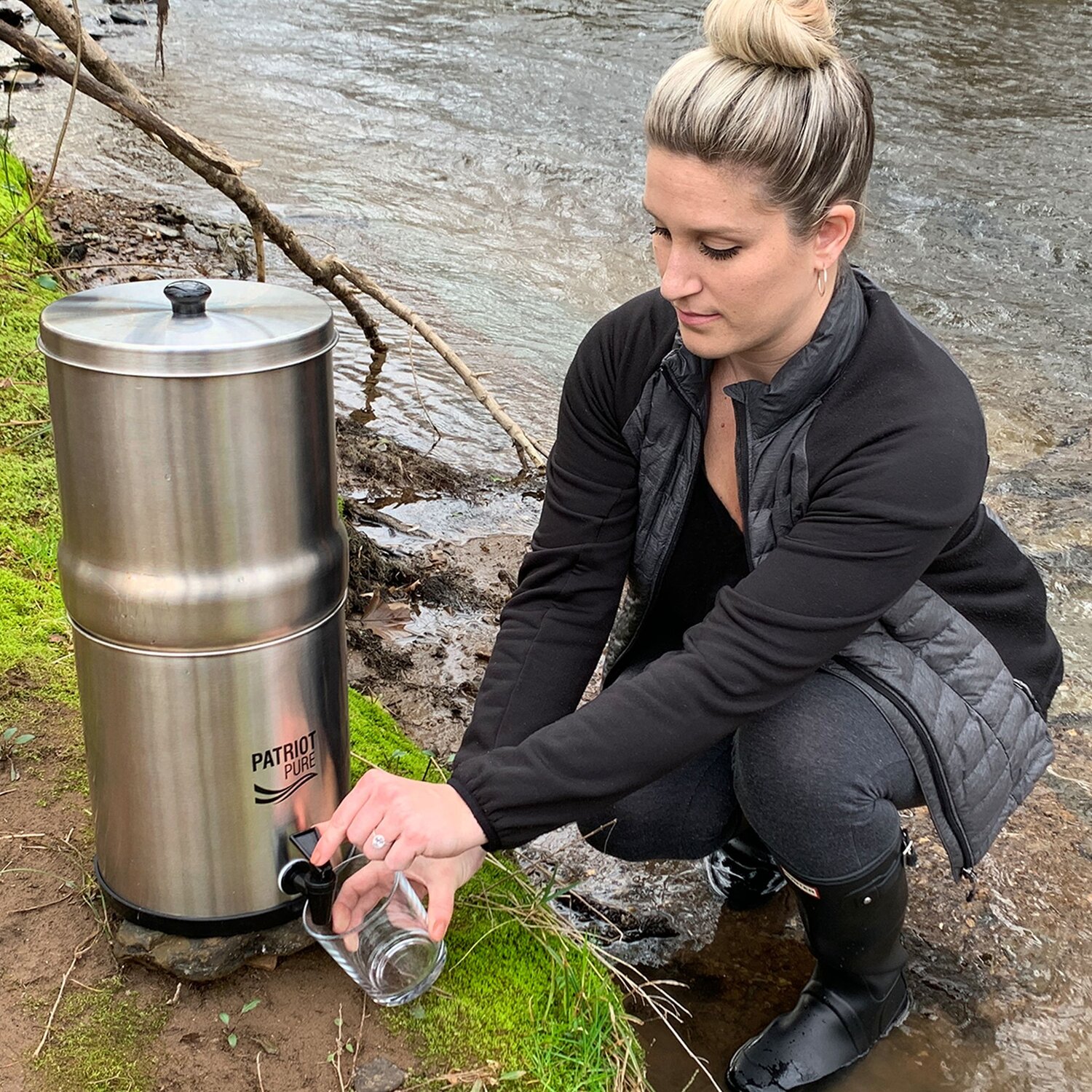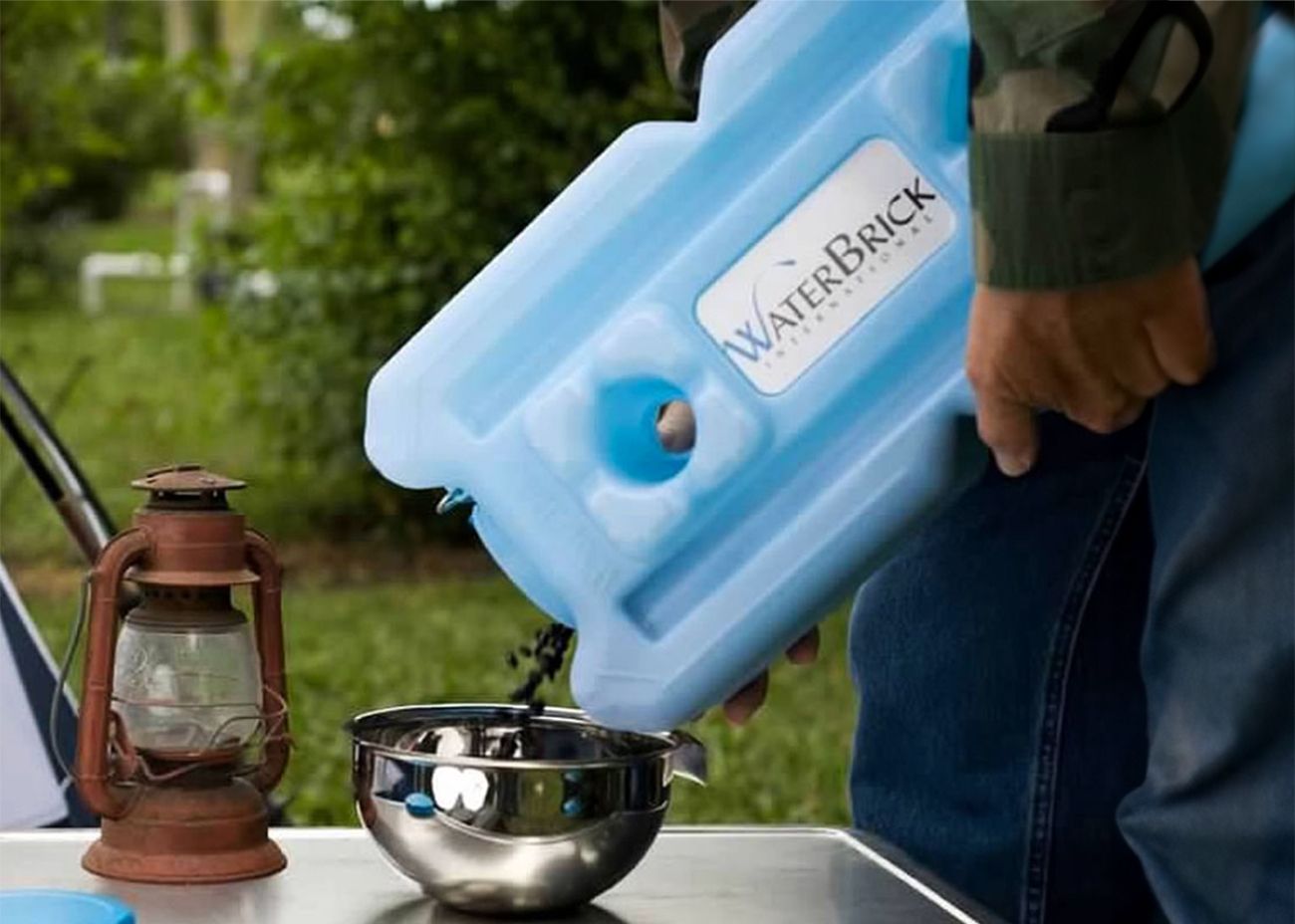Water Storage: For the Sake of Future “You”

“When the well has run dry, we know the worth of water.”
- Benjamin Franklin, 1758

Mr. Franklin knew a thing or two about many things. But I think it’s pretty clear what he is expressing here: Sometimes we don’t know what we’ve got until it’s gone.
Smart, preparedness-minded people like you ponder about what the future may look like. What we may have aplenty and what we may find scarce. When it comes to water, we cannot give even three days worth of time and expect to live without it. Water is essential to life.

Hi, my name is Morgan, a Preparedness Consultant here at 4Patriots. I work with people every day to create proper preparedness plans. I am also the lead instructor of all of our water filtration, storage, and catchment online courses. You can find these free classes here: 4patriotsuniversity.com.
In my last blog, I shared with you my practice for Everyday Water Solutions. If you have not read that one yet, go ahead and give it a read now!
As a company founded on the mission of offering tools to help every American prepare for whatever may come, we would be remiss if we did not address this key aspect of, not only your survival, but your “Thrival”(™): Water.
We rarely have to worry about where we are going to get our next drink of water. Daily, most of us have a fountain of limitless hydration directly accessible from our sinks, tubs, and even the outdoor water spigot (Us Gen X’ers took many a refreshing drink from the hose!). Bottled water, if you are in need, is aplenty on a regular basis. But how will you get that life-giving hydration in a SHTF scenario? Whether it be a hurricane, a tornado, a flood, or even, dare I say, supply chain issues, there are realistically several situations that could lead to the inability to obtain usable water…unless you already have it.
It’s not just about your ability to make dirty water cleaner and safer to drink. The next step in your preparedness planning is to store water for those times you may not be able to simply turn on the tap and collect.
Containers Galore…But Which is Best?
People store water in all sorts of containers, from plastic milk jugs to glass jars and rain barrels. Some simply buy a case of bottled water and store that for emergency use. When we think of storing water, we should think long-term. So, choosing the proper container in which to store your water is very important.
Some considerations to make when choosing a container are:
- Your footprint - How much space do I have in my home/ property to store this water? Keep in mind that if/ when facing an emergency situation, especially one whose aftermath may be more than a couple of days (think Hurricane Helene this Fall in North Carolina where initial emergency response took weeks), your stored water will be a priceless commodity. With that in mind, you want to protect that commodity by not storing it out in the open or where passersby can see it. The simplest place to store your water is where you will process it before use. That can be a garage, a mudroom, a storage shed.
- Mobility - Water is heavy (8.25 lbs per gallon, in fact). The ability to move your water storage should you have to “GO” is important. It would be a crying shame to lose that life-giving water you had properly stored, simply because the container was too heavy to lift.
- Container Material - Is it plastic and if so WHAT type of plastic? Some plastics are made for shorter term storage, while others are designed for the long haul. Is the container see through? Opaque? Solid? Fungus and other biofilms like to grow when light can pass through.
Where to Store my Water
Now that you’ve thought about your footprint, it’s time to think about where your water is stored.
- Since this is likely going to be its space for several months, you want to ensure it’s not in my way. Consider an area level with your main living space but that is not in a direct traffic path. An attached garage, a large pantry or walk-in closet could serve well.
- Water stays cleaner and is less likely to grow things like fungus when it’s kept in the dark. Light encourages growth, so the darker the room and the more solid the container, the better.
- Think Ahead. When you are ready to use this water, is it easily accessible to where you will process it? (Process it, you say? Don’t worry - we will get to that!)
- If you’ve chosen the right container, it is likely that you can stack them, saving yourself some space and/or creating more space for more water or other preps! Stackability is a must in my book.

Treating My Stored Water
There are methods of treating water out there: pool shock, bleach tablets, chlorine drops. Many people ask me which is best for treating your future drinking water. The simple answer is NONE. It is easy to “get it wrong” when applying treatment, and this is especially dangerous when we are going to imbibe a substance for the betterment of our health. Too much can make me sick or poisoned. Too little and I’m relying on treatment that doesn’t work to remove bacteria, virus and growth. So, my method? Nothing. I do not treat my water before storing it.
When the Time Comes to Tap into Your Water
Write this down, commit it to memory, put a star beside it in your preparedness notebook: Regardless of how long that water has sat untreated and stored, regardless if there is a biofilm or other growth, ALL Water gets Filtered Before Use. Period. It doesn’t matter if it has been 6 months or two years.
Think about it: We have the same water that has existed on Earth since the dawn of the dinosaurs. There is no new water. Regardless of where it sits, it can be used. The most important tool is a good water filter and filtration system. Scour the internet—there are thousands of filter options. But they are not all equal. I trust the Ultimate Water Filtration System using the Nanomesh filter to give me the cleanest, safest drinking water I can get. I use it daily at home with my tap water. It’s also what I will trust should the SHTF.
The 4Patriots Nanomesh water filter is certified in three areas, which is pretty impressive. First, it meets NSF 42 standards, which means it improves the taste and smell of water by removing things like chlorine and other minerals. Then there's NSF 53, which filters out harmful contaminants like lead, VOCs, and stuff like PFOA (“forever chemicals”) and chromium. And it meets NSF 401 standards, which focus on newer contaminants—things like trace amounts of prescription drugs, pesticides, and other chemicals. Basically, when you use it with their Ultimate Water Filtration System, you're covered.
Water Storage may feel like a daunting task, but take it step by step. With proper planning and the right tools, it’s quite simple.
So, let this be your call to action to get a move on your water storage solutions to ensure that you and your family have what you need in an emergency.
Let’s Thrive Today, Together.

This is the second in a series of water-related articles. Be prepared for my next post, in which I’ll discuss water catchment.
In the meantime, join me live on Wednesday, May 28 at 5 pm Central for 4Patriots University’s Water Solutions Class.
It’s free for you as a customer! All you have to do is click on the link above and scroll down to 'Book My Spot'. I really hope to see you there!

